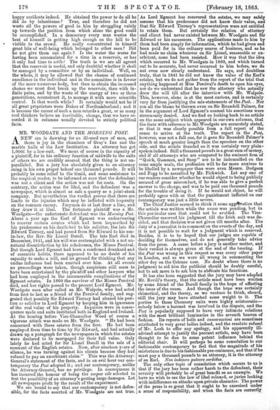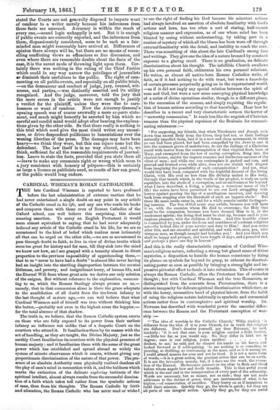MR. WOODGATE AND THE MORNING POST.
ANEW era is dawning for an ill-used race of men, and there is joy in the chambers of Gray's Inn and the marble halls of the Law Institution. An attorney has got
1,0001. by a law-suit. We mean of course in the capacity of a plaintiff, for in his ordinary function of midwife to the suits of others we are credibly assured that the thing is not un- paralleled. But a jury has absolutely given to an attorney suing in his own proper behoof one thousand pounds. It will probably be some relief to the timid, and some assistance to the sceptical reader, to be informed at once that the defendant was not a client and the action was not for costs. On the contrary, the action was for libel, and the defendant was a newspaper, which is almost as safe a quarry as a joint-stock company. But nevertheless the verdict proves that there are limits to the injuries which may be inflicted with impunity on the common enemy. Jurymen do at last draw a line, and they draw it at libel. The fortunate plaintiff was a Mr. Woodgate—the unfortunate defendant was the Morning Post. About a year ago the Earl of Egmont was endeavouring to recover certain estates which had been bequeathed by his predecessor on his death-bed to his solicitor, the late Sir Edward Tierney, and had passed from Sir Edward to his son- in-law, the Rev. Sir Lionel Darell. The late Earl died in December, 1841, and his will was contemplated with a not un- natural dissatisfaction by his coheiresses, the Misses Percival. But though Lord Egmont had been a confirmed drunkard and of eccentric habits, there appeared to be no doubt of his capacity to make a will, and no ground for thinking that any undue influence had been exerted over him. At all events no proceedings were taken, though suspicions still seem to have been entertained by the plaintiff and other lawyers who had been employed in the innumerable complications of the Egmont estates. In 1860 the survivor of the Misses Percival died, and her rights passed to the present Lord Egmont. Mr. Woodgate soon after called on Mr. Walpole, who had acted from first to last as a friend of the Percival family, and sug- gested that possibly Sir Edward Tierney had abused his posi- tion as solicitor to Lord Egmont by keeping him in ignorance of the real valve of his property. Inquiries were in conse- quence made and suits instituted both in England and Ireland. At the hearing before Vice-Chancellor Wood of course a vigorous attack was made on Mr. Woodgate. " He had been concerned with these estates from the first. He had been employed from time to time by Sir Edward, and had actually drawn up a paragraph for the newspapers in which the estates were declared to be mortgaged for their full value. Only lately he had acted for Sir Lionel Darell in the sale of a remnant of the English estates. Now, after nineteen years of silence, he was turning against his clients because they had refused to pay an exorbitant claim." This was the Attorney- General's statement of the facts, and in an evil hour our con- temporary the Post adopted it ; and our contemporary, unlike the Attorney-General, has no privilege. In consequence it has incurred the honour of being the corpus vile selected to test the possibility of an attorney's getting large damages. Let all newspapers profit by the result of the experiment. We are bound to say that our contemporary is not defen- sible, for the facts asserted of Mr. Woodgate are not true. As Lord Egmont has recovered the estates, we may safely assume that his predecessor did not know their value, and that Sir Edward Tierney's representatives were not entitled to retain them. But certainly the relation of attorney and client had never existed between Mr. Woodgate and Sir Edward or his successors. The applications made to him by them had been simply for information, which he had given and been paid for in the ordinary course of business, and as he had made no claim whatever on Sir Lionel, reasonable or ex- orbitant, none had been resisted. How it was that the idea which occurred to Mr. Woodgate in 1860, and which turned out to be accurate, had never occurred to him before, we do not even now clearly understand. He says, and doubtless truly, that in 1841 he did not know the value of the Earl's estates, but we do not gather from the report of the trial that anything happened at Miss Percival's death to open his eyes, nor do we understand that he saw the attorney who actually drew the will till after the interview with Mr. Walpole. This, however, alone is at the most curious, and is certainly very far from justifying the mis-statements of the Post. . Nor can all the blame be thrown even on Sir Roundell Palmer, for in the argument of Lord Egmont's counsel his assertions were strenuously denied. And we find on looking back to an article on the same subject which appeared in our own columns, that the facts with reference to Mr.Woodgate are accurately stated, so that it was clearly possible from a full report of the cause to arrive at the truth. The report in the Post, however, was not a full one, for it gave Sir Roundell Palmer's speech at much greater length than the speeches on the other side, and the article founded on it was certainly very plain- spoken indeed. Still a thousand pounds is a great sum of money, and if all attorneys who are compared to the eminent firm of "Quirk, Gammon, and Snap" are to be indemnified on the same ample scale, the profession will be far more anxious to be libelled by a newspaper than were even Messrs. Dodgeon and Fogg to be assaulted by Mr. Pickwick. Let any one of our readers consider whether he would object to being publicly accused of gross misconduct, if he was able to give a perfect answer to the charge, and was to be paid one thousand pounds for the trouble of doing it. If he would not object, he will probably agree with us that the punishment inflicted on our contemporary was just a little severe.
The Chief Justice seemed to think it some agervation that the article was written while the cause was pending, but in this particular case that could not be avoided. The Vice- Chancellor reserved his judgment till the Irish suit was de- cided, and that decision was not given till months after. The duty of a journalist is to comment on the events of the day, and it is not possible to wait for a judgment which is reserved. Besides, it is to be hoped that our judges are capable of deciding for themselves, and do not generally take advice from the press. A cause before a jury is another matter, and their verdict is always given at the end of the hearing. If the Post was wrong in this respect so was every other paper in London, and so we were all wrong in commenting the other day on the Colenso case. No doubt where there is no judgment to aid him the publicist should be doubly careful, but to ask more is to ask him to abdicate his functions.
It has also been suggested that the jury may have adopted Mr. Bovill's theory, that the article must have been written by some friend of the Darell family in the hope of affecting the issue of the cause. And though the hope was certainly chimerical, and the theory, as we venture to think, absurd, still the jury may have attached some weight to it. The parties to these Chancery snits were highly aristocratic— nobody below a baronet was involved in the dispute, and the Post is popularly supposed to have very intimate relations with the most brilliant luminaries in the seventh heaven of fashion. Its reports of balls and conversation are sometimes attributed to very great ladies indeed, and the resolute refusal of Mr. Lush to offer any apology, and his apparently ill- advised attempt to justify the peccant article, may have been thought to be due to some potent influence behind the editorial chair. It will perhaps be some consolation to our fashionable contemporary to feel that the magnitude of his misfortune is due to his fashionable pre-eminence, and that if he must pay a thousand pounds to an attorney, it is the attorney of an Earl. Non indecoro pulvere sordidus.
The only other topic of consolation which occurs to us is that if the jury has been rather harsh to the defendant, their severity will probably be of great benefit as an example. We have no wish to see the law of libel relaxed, or juries looking. with indifference on attacks upon private character. The power of the press is so great that it ought to be exercised under a sense of responsibility, and when the facts are correctly stated the Courts are not generally disposed to impute want of candour to a writer merely because his inferences from those facts are unsound. Accuracy is within the reach of every one,—sound logic unhappily is not. But it is enough if public events are correctly reported, and the inferences from them, dispassionately considered, seem to be such as a fair- minded man might reasonably have arrived at. Differences of opinion there always will be, but there are no means of recon- ciling conflicting views so efficacious as free discussion, and even where there are reasonable doubts about the facts of the case, it is the surest mode of throwing light upon them. Cer- tainly there was nothing in the ruling of the Chief Justice which could in any way narrow the privileges of journalists lir diminish their usefulness to the public. The right of com- menting on all public events, and especially on all public trials, —on the demeanour and conduct of judge, jury, counsel, wit- nesses, and parties,—was distinctly asserted and its utility recognized. And the judge, moreover, told the jury that the mere errors in the article were not enough to justify a verdict for the plaintiff, unless they were due to care- lessness or want of candour. Now the Attorney-General's opening speech was of course avowedly a mere ex-parte state- ment, and much might honestly be asserted by him which no careful and candid mind would adopt after hearing the explana- tions given by the other side. So that there really is nothing in this trial which need give the most timid writer any uneasi- ness, or drive despondent politicians to lamentations over the waning liberties of the press. The damages may have been heavy—we think they were, but this can injure none but the defendant. The law itself is in no way altered, and is, we think, sufficient for all the reasonable requirements of journal- ism. Leave to state the facts, provided that you state them all —leave to make any comments right or wrong which seem to a jury consistent with honesty of pirpose—this is certainly as large a licence as publicists need, as courts of law can grant, or the public would long endure.































 Previous page
Previous page